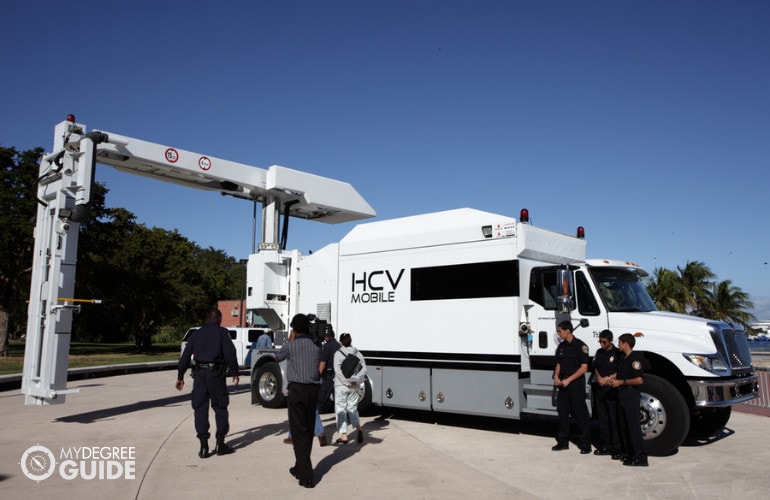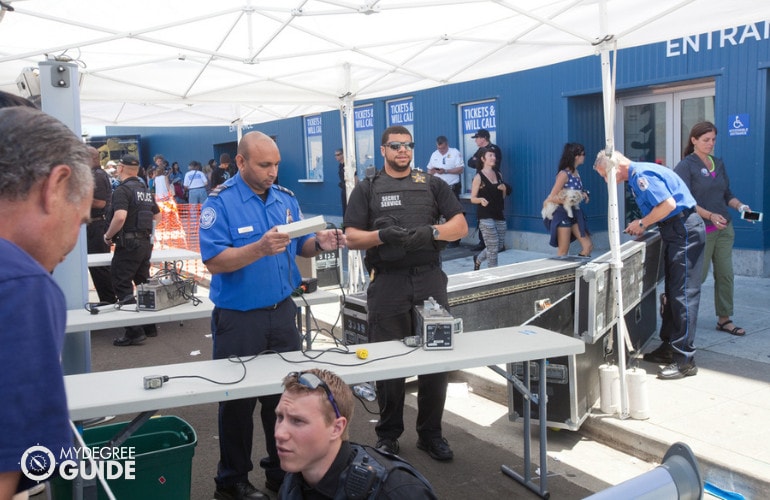As someone who cares deeply about protecting country and community, you could take the next step in your career development by earning an online doctorate in homeland security.

During this degree program, you can invest in professional growth and public service.
Editorial Listing ShortCode:
A doctoral program in homeland security can enable you to bolster your research knowledge, enhance your leadership skills, and ensure that you are at the forefront of the field.
Online Doctorate in Homeland Security Programs

A PhD or a doctorate in homeland security is a terminal degree in this important sector. Research and leadership are key focus areas for this degree program.
The coursework may cover topics like:
- Consultation services
- Emergency planning and response
- Infrastructure
- Intelligence
- Leadership
- Public policy
- Research
- Risk analysis
- Terrorism
Online degrees in homeland security generally offer flexibility and the option to enroll in school while continuing professional responsibilities. Some programs are fully online, while others have a few in-person intensives on the college campus or at an alternative site.
Editorial Listing ShortCode:
Some colleges have a standalone PhD in Homeland Security program. Others include this area of study as a concentration option for a criminal justice, management, or business administration doctorate. Programs tend to offer additional concentrations so that you can choose a track that corresponds to your career goals. The specializations for a homeland security doctorate may include leadership or public policy.
Many doctoral programs, especially PhD programs, include a dissertation component. This major research project could take several years to complete. Along the way, you may work closely with a faculty advisor, whose guidance can further your academic and professional growth.
A doctorate can lead to a variety of leadership positions or academic roles. Professionals tend to pursue careers in teaching, research, law enforcement, public health, emergency management, data security, or a related field.
Homeland Security Careers & Salaries

Homeland security jobs often entail criminal justice, protective services, information security, and disaster management.
By the time you’ve earned a doctoral degree, you may have moved beyond hands-on roles, like being a security screener or a border patrol officer. Rather, earning a doctoral degree helps prepare you to contribute new research, ideas, and leadership to the homeland security sector.
Those who work as researchers might fall into the political science job category. They can study the interactions between governments or the effects of various policies on national security. Working at a university could provide both research and teaching opportunities. A university might hire professionals in the field to work in their homeland security department or a related area, such as criminal justice.
Academia isn’t the only option, though, for people with doctorates in homeland security. There may be many leadership opportunities for those who would prefer to keep working as practitioners.
According to the Bureau of Labor Statistics, there are many sectors in which professionals with this doctoral degree may work.
| Careers | Annual Median Salaries |
| Chief Executives | $179,520 |
| Political Scientists | $122,510 |
| Information Security Analysts | $102,600 |
| First-Line Supervisors of Police and Detectives | $99,330 |
| Detectives and Criminal Investigators | $83,640 |
| Postsecondary Teachers | $79,640 |
| Urban and Regional Planners | $78,500 |
| Emergency Management Directors | $76,730 |
| Business Operations Specialists | $74,670 |
| First-Line Supervisors of Security Workers | $50,240 |
The job possibilities after doctoral degree programs in homeland security can vary greatly, depending on your previous training and experience.
Many people with a homeland security PhD hold roles in government agencies. Others, though, work in the private sector. In either context, your advanced education could make you a competitive candidate for leadership positions. Some professionals work as chief executives or directors of an organization.
By this point in your education and career, you might already have a strong foundation in a related field. Getting a homeland security doctorate could provide new knowledge and leadership abilities to enhance your work in that field.
Editorial Listing ShortCode:
For example, law enforcement officers may qualify for high-up roles in federal investigation and intelligence organizations. Engineers and urban planners may find opportunities related to infrastructure security. Other options are available for people in public health, foreign language translation, cybersecurity, and emergency management.
Homeland Security PhD Curriculum & Courses

The curriculum for a homeland security doctorate will include a mix of safety and justice courses as well as research-focused classes. The following are examples of courses you may come across:
- Cybersecurity: This class addresses advanced strategies for promoting network and data security.
- Fighting Terrorism: With tools and strategies for reducing threats, a counterterrorism class may play a key role in your national security studies.
- Infrastructure Protection: You’ll learn to analyze vulnerability points in an infrastructure system and create plans for remedying those weaknesses.
- Intelligence Strategies: In addition to covering intelligence collection and analysis, this course may also debate the ethical issues raised by intelligence efforts.
- Dissertation Process: In one or more courses, you’ll receive support and guidance for your dissertation proposal, research, and writing.
- Homeland Security Cooperation: During this class, you’ll discuss various organizations involved in counterterrorism and security and the best ways for them to communicate and work together.
- Leadership and Ethics: You’ll discuss leadership principles and values that should guide your professional methods and decisions.
- Quantitative and Qualitative Research: This course on research methods can equip you with essential skills that will be foundational to your dissertation project.
- Strong Communities: This class focuses on ways to bolster a group or community’s risk reduction and strengthen its disaster response.
- Terrorist Mindsets: The goal of this class is to better understand terrorist views and practices in order to subvert their work.
If your homeland security studies are part of a criminal justice or business program, you’ll likely have courses related to those subject areas as well.
How to Choose an Online Doctorate in Homeland Security Program

Homeland security is a rather new field of academic study, but there are still quite a few schools that offer doctoral degrees in this area. The following considerations can help you narrow down what sort of program you’d like:
- Accreditation. For any doctoral degree, a regionally accredited school is highly recommended.
- Degree program. Homeland security can be a standalone doctoral degree or a specialty area for criminal justice or business studies.
- Dissertation requirements. Most doctoral programs have students complete a major research project. You may be able to integrate this project with your current professional efforts.
- Faculty. It’s strategic to verify that your professors’ research areas will complement your own areas of interest.
- Length to completion. A number of programs advertise that you can complete the entire program, including the dissertation, in 3 to 4 years.
- Online format. A school may use a cohort model or allow you to advance at your own pace. Some colleges have fully online programs, and others require attendance at a few in-person intensive sessions.
- Program size. It’s often easier to gain admission to less-exclusive programs, but smaller group sizes may allow for more individualized attention.
- Transfer policies. If you’ve taken any previous doctoral courses or have military experience, you may be able to receive transfer credit from some schools.
Current or recent students might be able to offer valuable insight into the benefits or drawbacks of a particular college.
Admissions Requirements

In addition to submitting an application form and fee, getting into a homeland security doctoral program may require the following:
- College transcripts that reflect a minimum GPA, often 3.0
- GRE or GMAT scores (only required at some schools)
- Interview with a member of the admissions committee
- Personal statement about your research plans and career trajectory
Some homeland security programs require you to hold a master’s degree before you can be admitted. Other schools’ minimum prerequisite is a bachelor’s degree.
Homeland Security Doctoral Programs Accreditation

Regional accreditation is a top consideration when deciding where to enroll for your graduate program. Earning a doctorate at a regionally accredited school ensures it will be widely recognized as credible. Otherwise, you run the risk of employers and other colleges disregarding the hard work that you put into earning this degree.
Editorial Listing ShortCode:
Reputable colleges receive regional accreditation. This mark of approval is given to schools that educate students well and operate in financially sustainable ways. Choosing an accredited school can have valuable implications when it comes to receiving financial aid, transferring credits, or applying for jobs.
Homeland Security Certifications and Licensure
Completing certification programs can show potential employers that you are a competent professional with the advanced skills to succeed in leadership positions. Here are a few certifications in the field of homeland security:
- Certified Homeland Protection Associate (CHPA): This five-level series of credentials from the National Sheriffs’ Association (NSA) and the National Domestic Preparedness Coalition (NDPCI) is intended for those just getting started in the homeland security field.
- Certified Homeland Protection Professional (CHPP): Also offered by NSA and NDPCI, this program confers a higher level of certification on those who have education and experience in the field.
- Certified Information Systems Security Professional (CISSP): With relevant education and work experience, professionals in cybersecurity can pursue this certification from the International Information System Security Certification Consortium (ISC)².
Although raises and promotions are not guaranteed after earning certificates, becoming certified may strengthen your resume and give you greater leverage during compensation negotiations.
Financial Aid and Scholarships

If you qualify, financial aid can help you fund your doctoral studies. As a graduate student, you may be able to collect assistance from a variety of sources.
Students typically start by looking into government aid, which can come from both state and federal programs. Loans are more common for graduate studies, but some students qualify for grants as well. The government financial aid process begins with submitting the Free Application for Federal Student Aid (FAFSA).
Your prospective college could be another key source of graduate funding. Some schools have stipends available for their PhD candidates. Scholarship programs from industry organizations, such as the CIA, may be available specifically for students in homeland security or a related field. Other scholarship funds might be available to graduate students in a variety of disciplines.
Some workplaces even agree to pay part of their employees’ school costs since they can benefit from their workers receiving additional education.
Can You Get a Doctorate in Homeland Security?

Yes, a number of schools offer doctoral degrees with a focus on homeland security. Often, this field is a concentration option for a doctorate in business, management, or criminal justice.
Online studies are a common option for homeland security students. During the program, you may have to come to campus only a handful of times, if at all. Earning a doctoral degree in this field could help qualify you to lead initiatives in security management or strategic intelligence.
What Can You Do with a Doctoral Degree in Homeland Security?
Homeland security PhD programs can equip you with the knowledge and credentials to qualify for leadership roles in your area of expertise.
Depending on your previous training, that could be civil engineering, information security, regional planning, epidemiology, or law enforcement. Alternatively, holding a doctorate might qualify you for university faculty positions or research jobs. A doctoral degree is usually a requirement for tenure-track positions, in particular.

Some professionals also work as political scientists in non-university settings. According to the Bureau of Labor Statistics, about half of all political scientists work for the federal government.
Should I Earn an Online PhD in Homeland Security?
If you have a strong sense of duty to your country and your community, then earning a doctoral degree in homeland security could be a way to give this field your very best efforts.
This degree might also be a good fit if you:
- Are interested in advanced roles in federal agencies
- Enjoy research, writing, and scholarship
- Possess leadership skills
- Want to pursue a career in academia
- Want to merge your current field with homeland security efforts
Since homeland security is a diverse field, students have many different reasons for committing to doctoral studies.
How Long Does It Take to Get a PhD in Homeland Security Online?

Many PhD online programs are designed to be completed within 3 to 5 years, including the dissertation portion of the process.
They’re also set up with working professionals in mind so that you can fit full-time doctoral studies around your other obligations. If a doctorate program doesn’t require a dissertation, it can typically be completed in 3 years with full-time study.
Part-time enrollment can extend your schooling process. Also, you may need extra time to complete the research and writing for your dissertation.
Is a Doctorate in Homeland Security Worth It?
Yes, a doctorate in homeland security is worth it for many students. Homeland security is a developing field with growth opportunities, and your efforts may help protect people and systems.
Editorial Listing ShortCode:
The Bureau of Labor Statistics predicts that, over the next decade, many jobs related to homeland security will experience job growth that’s on par with the national average. Examples include criminal investigators, regional planners, and political scientists. Also, advancing your education in this field may help you secure federal employment opportunities.
Universities Offering Online Doctorate in Homeland Security Degree Programs
Methodology: The following school list is in alphabetical order. To be included, a college or university must be regionally accredited and offer degree programs online or in a hybrid format.

American Public University offers an online Doctor of Global Security program. Each course is 8 weeks long. To graduate, students must complete 58 credit hours. Applicants must submit proof of a completed master’s degree in a related field with a GPA of 3.0, a resume, three references, and an admissions essay.
American Public University also offers a masters in homeland security online.
APUS is accredited by the Higher Learning Commission.

Colorado Technical University offers a Doctor of Management with an emphasis in Homeland Security. To graduate with the concentration, students must complete 100 credit hours and a dissertation. Applicants must submit an entrance essay and official transcripts from previously attended schools and complete a doctoral interview.
Colorado Technical University is accredited by the Higher Learning Commission.

Liberty University offers a Ph.D. in Criminal Justice in Homeland Security. Students must complete 60 credit hours and submit a final dissertation to graduate. All classes can be completed online and are 8 weeks long. Applicants must have a master’s degree with a GPA of 3.0 or higher and mail in official transcripts.
Liberty University is accredited by the Southern Association of Colleges and Schools Commission on Colleges.

National University offers a PhD-BA in Homeland Security Leadership and Policy. The program requires the completion of 20 courses. It can typically be finished in 45 months.
To be eligible for the program, applicants must submit all official transcripts. These will be used to conduct an academic evaluation to determine eligibility and the number of transferable credits available.
National University is accredited by the WASC Senior College and University Commission.

New Jersey City University offers a Doctor of Science in Civil Security—Leadership, Management, and Policy. To graduate, students must complete 30 credit hours, including 18 credits from a dissertation. Applicants must have a master’s degree, 4 years of professional experience, and GRE, GMAT, or MAT test scores.
New Jersey City University is accredited by the Middle States Commission on Higher Education

Saint Leo University offers an online Doctorate of Criminal Justice with a specialization in Homeland Security. Students must complete 60 credit hours to graduate. Applicants must have a master’s degree from a related field with a minimum GPA of 3.25 and submit copies of their official transcripts, 2 letters of recommendation, and a personal statement.
Saint Leo University is accredited by the Southern Association of Colleges and Schools Commission on Colleges.

St. John’s University offers a Doctor of Professional Studies in Homeland Security. The program, which can be completed online, requires students to complete 78 credit hours to graduate. Applicants must submit their GRE test scores, 3 letters of reference, and a personal statement. An interview with the admission committee may be required.
St. John’s University is accredited by the Middle States Commission on Higher Education.

Texas A&M International University offers a Doctor of Philosophy in Criminal Justice. While their first semester must be completed on campus, students may complete their other semesters online. Students must complete 49 credit hours to graduate. Applicants must submit official transcripts from all schools attended, GRE test scores, and two letters of recommendation.
Texas A&M International University is accredited by the Southern Association of Colleges and Schools Commission on Colleges.

The University of North Georgia offers a Ph.D. in Criminal Justice with a concentration in Intelligence. To graduate, students must complete 54 credit hours, including 15 hours from a dissertation. Applicants must have a graduate degree from a related field with a minimum GPA of 3.2 and submit official GRE test scores.
UNG is accredited by the Southern Association of Colleges and Schools Commission on Colleges.

Walden University offers a Ph.D. in Criminal Justice with a concentration in Homeland Security Policy and Coordination. Students must complete 68 credit hours to graduate. A fast track option is available that allows students to take 3 courses a semester instead of 2. Applicants must submit an online application with official transcripts through the university’s website.
Walden is accredited by the Higher Learning Commission.
Getting Your Doctorate in Homeland Security Online

Homeland security professionals make a vital difference in the safety of the country and the security of the people around them. If you are committed to this field, then earning a doctorate could help you increase your impact.
A terminal degree may help qualify you for teaching or leadership roles with a university, the federal government, or another organization. Online studies are a convenient way to earn your homeland security doctorate. With an accredited online homeland security degree program, you can earn a credible degree as you take courses and receive dissertation guidance from afar.
If you’re ready to advance your expertise in this field, you can start your doctoral journey today by checking out accredited homeland security programs.

